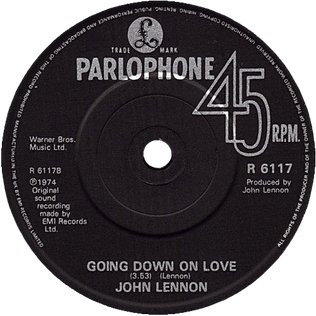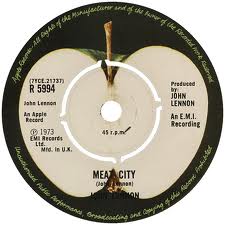"Surprise, Surprise " is a song written by John Lennon that was first released on his 1974 album Walls and Bridges. Elton John contributes harmony vocals to the song.
"Well Well Well" is a song by English musician John Lennon from his 1970 album John Lennon/Plastic Ono Band. The eighth and longest track on the album, "Well Well Well" features an aggressive guitar sound, screaming vocals and a pounding backing track.

"My Mummy's Dead" is the closing song on the album John Lennon/Plastic Ono Band by John Lennon. The song was also released on a Mexican EP that also contained "Mother", "Isolation" and "Look at Me".

"Going Down on Love" is a song by John Lennon, released as the first track on his 1974 album Walls and Bridges. It was also released as the B-side of Lennon's "Jealous Guy" single in 1985.
"Old Dirt Road" is a song written by John Lennon and Harry Nilsson, first released on Lennon's 1974 album Walls and Bridges. Nilsson later recorded the song on his 1980 album Flash Harry.
"Tight A$" is a song written by John Lennon released on his 1973 album Mind Games. The song is also included in the 2010 compilation album, Gimme Some Truth. A tongue-in-cheek rocker, Lennon managed to get the phrase "tight ass" past the censors.
"Out the Blue" is a song written by John Lennon and originally released on his 1973 album Mind Games. The song is included on the 1990 boxset Lennon, the 2005 two-disc compilation Working Class Hero: The Definitive Lennon, the 2010 album Gimme Some Truth and the 2020 compilation album Gimme Some Truth. The Ultimate Mixes.
"I Know (I Know)" is a song written by John Lennon released on his 1973 album Mind Games. The song is included on the 1998 box set John Lennon Anthology and the 2020 compilation album Gimme Some Truth. The Ultimate Mixes.

"Meat City" is a song written by John Lennon, released as the 12th and final track on his 1973 album Mind Games. The song is also the B-side of the single of the same name, and is included on the 2010 album, Gimme Some Truth.
"Nobody Loves You (When You're Down and Out)" is a song written by John Lennon released on his 1974 album Walls and Bridges. The song is included on the 1986 compilation Menlove Ave., the 1990 boxset Lennon, the 1998 boxset John Lennon Anthology, the 2005 two-disc compilation Working Class Hero: The Definitive Lennon, and the 2010 boxset Gimme Some Truth.

"Sisters, O Sisters", also known as "Sisters O Sisters", is a song written by Yoko Ono that first appeared on John Lennon's and Yoko Ono's 1972 Plastic Ono Band album Some Time in New York City, backed by Elephant's Memory. It was also released as the b-side to the couple's "Woman Is the Nigger of the World" single. It has been covered by a number of artists, including Le Tigre and Tater Totz.
"The Luck of the Irish" is a song written by John Lennon and Yoko Ono that was first released on the couple's 1972 Plastic Ono Band album with Elephant's Memory, Some Time in New York City. It was written in late 1971 and was performed by Lennon and Ono live at several protest rallies and television appearances before being released on the album. It had been slated to be the first single from Some Time in New York City backed by "Attica State" but the release was shelved in favor of "Woman Is the Nigger of the World". A live acoustic performance was released on several John Lennon compilation albums.
"New York City" is a song written by John Lennon that was first released on Lennon's and Yoko Ono's 1972 Plastic Ono Band album Some Time in New York City.
"We're All Water" is a song written by Yoko Ono that was first released on the 1972 John Lennon and Yoko Ono Plastic Ono Band album Some Time in New York City. It was the last song on the first record of the album, and the last song on the album that was recorded in the studio.

"What You Got" is a song written by John Lennon that was first released on his 1974 album Walls and Bridges. It was later released as the B-side to his top 10 #9 Dream single.
"Bless You" is a song written by John Lennon that was first released on his 1974 album Walls and Bridges. It is a ballad expressing his love for his wife Yoko Ono, even though they were separated at the time. Alternative versions appeared on the compilation albums Menlove Ave. and John Lennon Anthology
"Scared" is a song written by John Lennon that was first released on his 1974 album Walls and Bridges. Alternate versions were subsequently released on the compilation albums Menlove Ave. and John Lennon Anthology.

"Touch Me" is a song written by Yoko Ono that was first released on her 1970 album Yoko Ono/Plastic Ono Band. An edited version was later released in the U.S. as the b-side to John Lennon's single "Power to the People."

"Move Over Ms. L" is a song written by John Lennon. It was originally intended to be released on his 1974 album Walls and Bridges but was left off shortly before the album release, and was eventually released as the b-side to Lennon's "Stand by Me" single. In the interim it was released by Keith Moon on his album Two Sides of the Moon. Moon also released it as the B-side of his "Solid Gold" single.
"Sunday Bloody Sunday" is a song written by John Lennon and Yoko Ono that was first released on their 1972 Plastic Ono Band album with Elephant's Memory, Some Time in New York City. The song addresses the Bloody Sunday massacre of 1972 and is one of two on the album that addresses the contemporary Northern Ireland conflict, "The Luck of the Irish" being the other.







